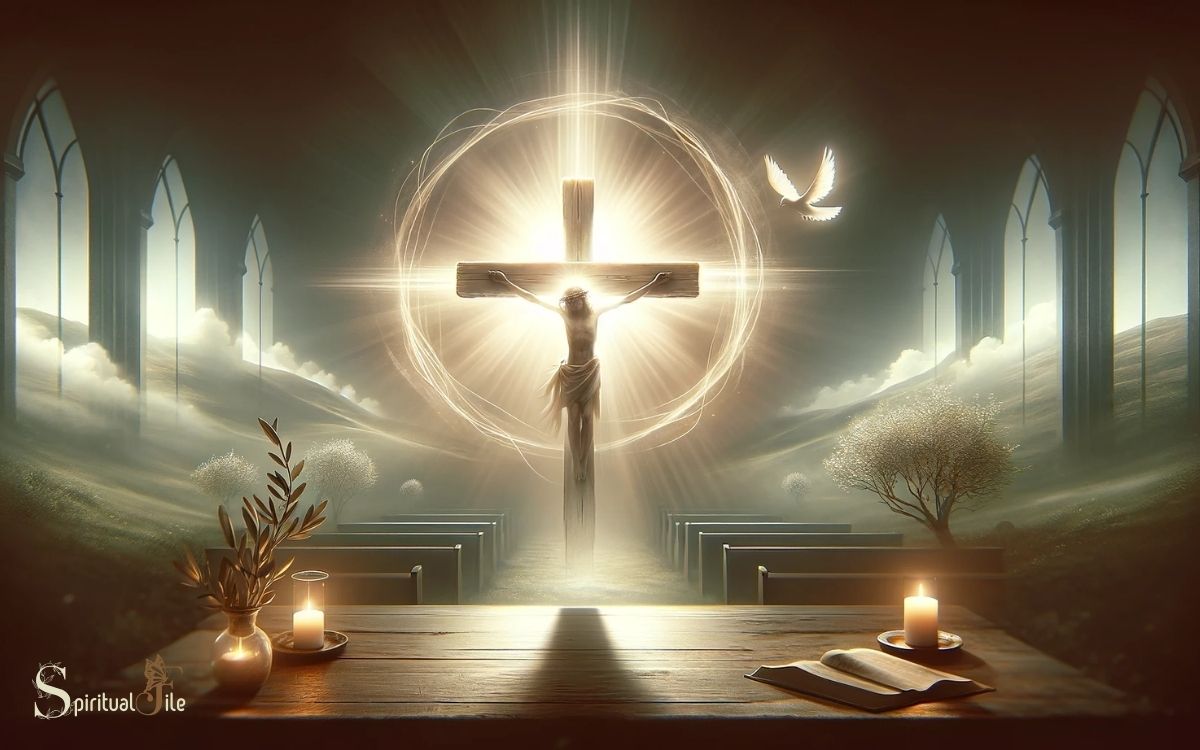Spiritual Meaning of Good Friday: Passion!
Good Friday holds significant spiritual meaning as it commemorates the crucifixion and death of Jesus Christ.
For Christians, it is a day of solemn reflection on the sacrifice Jesus made to atone for humanity’s sins. Services often include readings of the Passion, veneration of the cross, and moments of silence.
Good Friday is observed during Holy Week on the Friday before Easter Sunday. The day focuses on the narrative of Jesus’ arrest, trial, and crucifixion, as recounted in the Christian Gospels.
The spiritual significance of Good Friday lies in the belief that through Jesus’ suffering and death, he became the sacrificial lamb, taking upon himself the sins of the world, which allows for the reconciliation between God and humankind.
Observances vary but typically include:
On Good Friday, believers around the world participate in solemn observances, honoring the day Jesus willingly endured crucifixion for the salvation of mankind.

Key Takeaway
Historical Significance
I rarely find myself in agreement with the majority, but when it comes to the historical significance of Good Friday, I am compelled to acknowledge its universal importance.
Good Friday marks the crucifixion of Jesus Christ and is a pivotal event in Christian theology. It symbolizes the ultimate sacrifice, demonstrating God’s love for humanity.
The historical significance of this day reverberates through time, serving as a cornerstone of the Christian faith. It represents the culmination of Jesus’ earthly mission and the fulfillment of prophecies, carrying profound implications for believers.
The events of Good Friday have shaped the course of history, influencing art, literature, and culture.
Understanding its historical context provides insight into the foundations of Christianity and fosters a deeper appreciation for the spiritual significance of this solemn observance.
Biblical Narrative
The biblical narrative of Good Friday recounts the events leading to the crucifixion of Jesus Christ. It is a solemn and poignant account that holds deep significance for Christians around the world.
The betrayal by Judas, the denial by Peter, and the unjust trial before Pilate are all pivotal moments in this narrative. Each event serves as a profound reminder of the immense sacrifice made for humanity’s salvation.
The ultimate act of love and forgiveness is embodied in the crucifixion itself, as Jesus willingly gives his life to atone for the sins of mankind.
| Emotion | Response |
|---|---|
| Sorrow | Reflect on sacrifice |
| Empathy | Feel connected |
| Gratitude | Acknowledge grace |
| Compassion | Sense of forgiveness |
| Reverence | Honor and worship |
Symbolism of the Cross
As we approach the significance of Good Friday, the symbolism of the cross holds a profound spiritual depth.
The cross serves as a symbol of sacrifice, representing the ultimate act of love and atonement. It also stands as an emblem of redemption, offering hope and the promise of forgiveness.
Furthermore, the cross is a cornerstone of faith, inspiring believers to trust in the power of divine grace and salvation.
Cross as Sacrifice Symbol
On Good Friday, a single symbol stands at the heart of the Christian faith: the Cross. The Cross, in its essence, represents the ultimate sacrifice.
Its vertical beam points towards the divine, symbolizing the connection between heaven and earth, while the horizontal beam represents the relationship between humans.
The act of crucifixion itself was a gruesome and painful form of execution, and the Cross serves as a reminder of the immense sacrifice made by Jesus Christ for the salvation of humanity.
The willingness to endure such suffering for the greater good is a profound demonstration of selflessness and love.
The Cross, therefore, embodies the concept of sacrifice, inspiring believers to reflect on the depth of this sacrifice and to live lives of gratitude and service in response. This sacrificial symbol lays the groundwork for understanding the redemptive nature of the Cross.
Cross as Redemption Emblem
In my exploration of the spiritual meaning of Good Friday, I see the Cross as a powerful emblem of redemption, building upon its significance as a symbol of sacrifice.
The concept of redemption is deeply embedded in the symbolism of the Cross, representing the ultimate act of divine love and grace.
The intersection of the vertical and horizontal beams is where humanity’s reconciliation with the divine took place. It signifies the lifting of burdens, the forgiveness of sins, and the promise of eternal life.
The Cross, as a symbol of redemption, serves as a profound reminder of the transformative power of faith and the possibility of spiritual rebirth.
It invites contemplation on the depth of divine mercy and the potential for personal redemption, making Good Friday a poignant and hopeful observance for believers.
Cross as Faith Cornerstone
The symbolism of the Cross as the cornerstone of my faith is deeply meaningful and foundational to my spiritual beliefs. The Cross represents the ultimate sacrifice and love, serving as a constant reminder of Christ’s unwavering devotion.
Its significance resonates through the following points:
- Sacrificial Love: The Cross embodies the concept of sacrificial love, demonstrating Christ’s willingness to suffer for the redemption of humanity.
- Forgiveness and Mercy: It symbolizes the forgiveness and mercy offered to all, regardless of their sins and shortcomings.
- Eternal Hope: The vertical beam reaching towards the heavens signifies the promise of eternal life and hope for the future.
- Unity and Reconciliation: The intersection of the horizontal and vertical beams represents the unity of humanity and the reconciliation between God and mankind.
The Cross, as the faith cornerstone, encapsulates these profound spiritual truths, providing strength and guidance in my spiritual journey.
Suffering and Redemption
Through my own experiences and reflections, I’ve come to understand the deep spiritual significance of suffering and redemption on Good Friday. The suffering of Jesus on the cross is a profound symbol of the pain and trials that humanity endures.
It serves as a reminder that suffering is an inevitable part of life, but it can lead to redemption and salvation. The act of Jesus sacrificing himself for the sins of humanity is seen as the ultimate act of redemption, offering hope and forgiveness to all.
This act demonstrates the profound love and mercy of God, providing a path to spiritual renewal and transformation.
Good Friday, therefore, is a time to contemplate the redemptive power of suffering, and to find solace in the belief that through our own struggles, we can find healing and redemption.
Impact on Christian Faith
Reflecting on the suffering and redemption experienced on Good Friday has profoundly impacted my Christian faith. It has deepened my understanding of the sacrificial love demonstrated by Jesus Christ and strengthened my commitment to living according to His teachings.
The impact of Good Friday on my Christian faith can be summarized in the following ways:
- Renewed Gratitude: Good Friday reminds me of the immense sacrifice made for humanity, leading to a renewed sense of gratitude for the unmerited gift of salvation.
- Increased Empathy: Contemplating the suffering of Christ fosters a heightened empathy towards the pain and struggles of others, encouraging a more compassionate outlook on life.
- Heightened Devotion: The events of Good Friday inspire a deepened sense of devotion and a desire to live a life that reflects Christ’s love and sacrifice.
- Strengthened Hope: Good Friday serves as a reminder of the hope and redemption that is available through faith, even in the face of challenges and suffering.
Observances and Traditions
On Good Friday, I observe solemn traditions that center around the commemoration of Jesus Christ’s crucifixion.
This day holds deep significance for Christians worldwide, and the observances and traditions associated with it reflect the somber and reflective nature of the occasion.
Many Christians attend church services that focus on the last moments of Jesus’ life, often including the reading of the Passion narrative and the veneration of the cross.
Some communities also participate in processions, carrying crosses or reenacting the Stations of the Cross to symbolically walk the path that Jesus took to his crucifixion.
Additionally, fasting and abstinence are common observances on Good Friday, serving as a way to honor Jesus’ sacrifice and express repentance.
These traditions foster a sense of reverence and contemplation, allowing individuals to connect deeply with the spiritual significance of the day.
Reflection and Contemplation
As I ponder the significance of Good Friday, my thoughts turn to the solemn act of reflection and contemplation. This day prompts me to delve into deep introspection, considering the sacrifice made and the profound love demonstrated.
In this time of reflection, I find myself contemplating the following:
- The significance of Jesus’ crucifixion in the context of my own life and beliefs.
- The impact of Jesus’ sacrifice on the world and the timeless lessons it holds.
- The meaning of suffering and how it can lead to transformation and redemption.
- How I can embody the spirit of sacrifice and love in my daily life, following Jesus’ example.
Engaging in these reflections encourages a deeper understanding of the spiritual significance of Good Friday and its enduring importance.
Hope and Spiritual Renewal
Feeling a renewed sense of hope and spiritual strength on Good Friday, I am reminded of the profound impact of Jesus’ sacrifice and the timeless significance it holds for my own life.
This day marks a pivotal moment in the Christian faith, where the ultimate act of love and redemption unfolded.
The agony and suffering that Jesus endured on the cross are not only a symbol of compassion and forgiveness but also a source of immense hope for believers.
It signifies the potential for spiritual renewal and the promise of a new beginning. Good Friday serves as a reminder that even in our darkest moments, there is the possibility of transformation and growth.
It is a time for introspection, repentance, and a deepening of faith, leading to a renewed sense of hope and purpose in our spiritual journey.
Conclusion
As I reflect on the spiritual meaning of Good Friday, I am reminded of the depth of love and sacrifice that it represents.
Like a gentle rain after a long drought, Good Friday offers hope and spiritual renewal, inviting us to contemplate the profound significance of suffering and redemption in our lives. It is a time to seek solace and find strength in the enduring message of faith and love.






